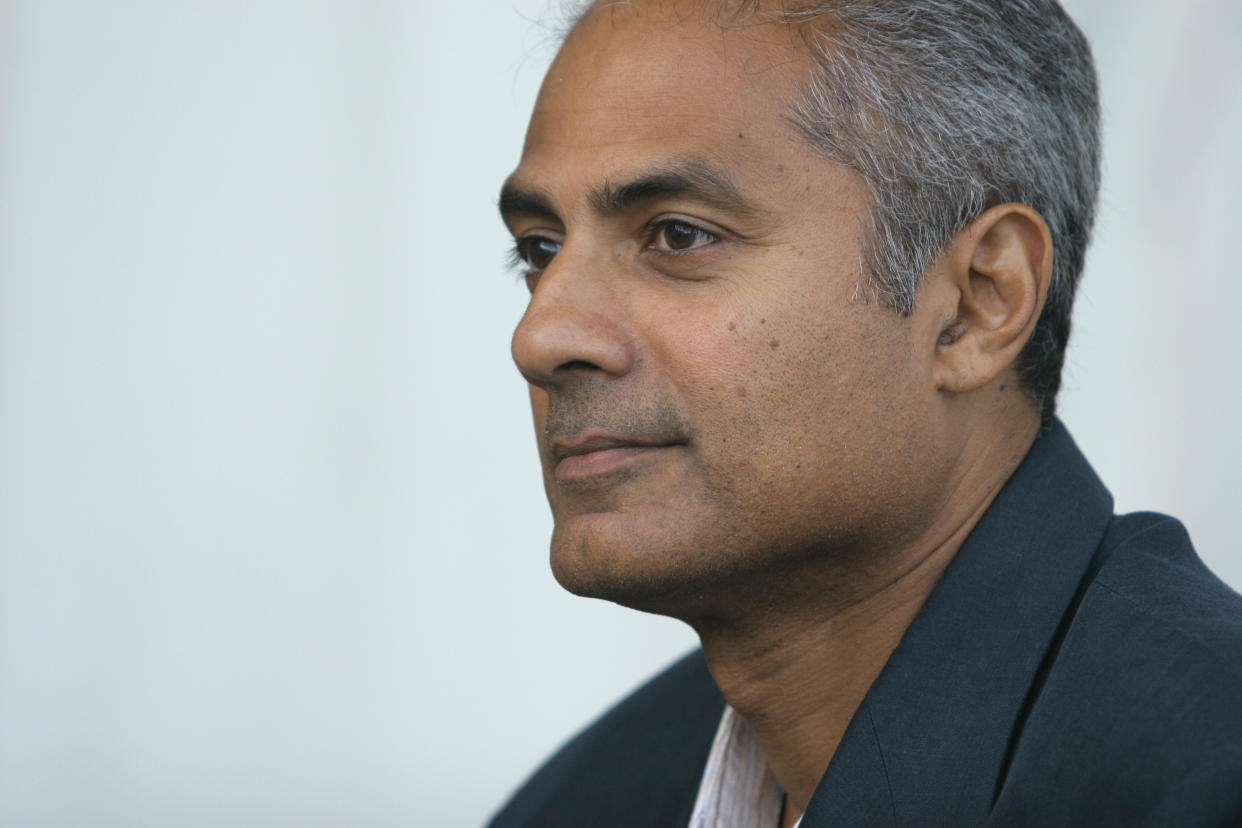BBC newsreader George Alagiah reveals his bowel cancer has spread to his lungs

The BBC newsreader George Alagiah has revealed his bowel cancer has spread to his lungs.
Read more: Dame Julie Walters reveals bowel cancer battle
The journalist, 64, was diagnosed with the disease in 2014, which later invaded his liver and lymph nodes.
Doctors told Alagiah in April the cancer is now in his lungs, but is not yet considered terminal.
![EDINBURGH, SCOTLAND - AUGUST 25: [EDITORS NOTE: this picture has been converted in black and white] British newsreader, journalist and television news presenter George Alagiah attends a photo call during Edinburgh International Book Festival 2019 on August 25, 2019 in Edinburgh, Scotland. (Photo by Simone Padovani/Awakening/Getty Images)](https://s.yimg.com/ny/api/res/1.2/oILC4PUrPwFABHstwbzUZw--/YXBwaWQ9aGlnaGxhbmRlcjt3PTk2MDtoPTY0MA--/https://media-mbst-pub-ue1.s3.amazonaws.com/creatr-images/2020-06/d6dba1d0-abc0-11ea-aef7-4d2945de7395)
Around 42,300 people are diagnosed with bowel cancer every year in the UK, making it the fourth most common form of the disease.
If the tumour spreads to the lungs or liver, it is considered advanced and stage four.
Alagiah seemed to have beaten his bowel cancer in 2014, only to be told it had returned three years later.
“My doctors have never used the word ‘chronic’ or ‘cure’ about my cancer,” the Sri-Lankan born newsreader told The Times.
“They’ve never used the word ‘terminal’ either.
“I’ve always said to my oncologist, ‘Tell me when I need to sort my affairs out’, and he’s not told me that, but what he did tell me is that the cancer is now in a third organ. It is in my lungs.”
Read more: BBC presenter with 'incurable cancer' is free of the disease
Alagiah, who tested positive for the coronavirus in March, seems surprisingly calm about his diagnosis.
“I said to my doctor, ‘You’re going to have to do the worrying for me’,” he said.
“I don’t want to fill my mind with worry. I just know that he’s a clever guy, doing everything he can.”
Alagiah, who is on more intense chemotherapy to combat his advancing cancer, only told his editor about his worsening condition until now.
What is bowel cancer? And what are its symptoms?
Bowel cancer, also known as colon or rectal cancer, is a general term for tumours that begin in the large bowel.
More than 90% of patients experience one of three sets of symptoms.
The first is blood in the faeces for no obvious reason.
A persistent change in bowel habits is another warning sign, with some producing more faeces than normal, which may be runny.
Pain, bloating or discomfort in the lower abdomen should also raise alarm bells. This may occur alongside a loss of appetite or losing weight without trying.
Read more: The cancers on the rise - and the decline - in the UK
Most of the time, blood in the faeces is caused by haemorrhoids, while a change in bowel habits may come down to something you have eaten.
If you experience one or more of the above, or if just one symptom lasts over four weeks, see a GP.
Colon cancer can also trigger bowel obstruction, when a tumour stops waste passing through the digestive system.
This triggers severe abdominal pain, always brought on by eating.
Another symptom of obstruction is the midsection “constantly” being swollen.
Diagnosis usually involves an examination of the backside.

What causes bowel cancer?
The exact cause of bowel cancer is unknown, however, there are defined risk factors.
Almost nine in 10 cases occur in people aged 60 or over.
A diet high in red and processed meat, and low in fibre, is another risk.
Bowel cancer is more common in those who are overweight, inactive and drink excessively.
Smoking may also raise the risk.
Some risk factors cannot be altered, like a family history of bowel cancer or another colon condition, such as Crohn’s disease or ulcerative colitis.
Is bowel cancer screened for?
The NHS offers two types of screenings for bowel cancer.
An at-home kit is offered to men and women aged 60-to-74 every two years.
Patients collect one sample of faeces in a small plastic bottle, which they post back to a laboratory for testing.
If blood is found, a thin tube called a colonoscopy is inserted into the patient’s anus to look for other signs of bowel cancer.
Read more: Processed meats containing this preservative are linked to colon cancer
A new test called the bowel scope screening is being offered to people aged 55.
This involves a thin, flexible tube with a camera on the end looking inside the bowel for small growths called polyps, which can become cancerous.
The one-off test is being rolled out across England.
How is bowel cancer treated?
Treatment depends on where the tumour is in the bowel and if it has spread.
Surgery is usually the go-to treatment, removing the cancerous section of the colon.
According to the NHS, “it's the most effective way of curing bowel cancer and in many cases is all you need”.
In more severe cases, chemo or radiotherapy may be required to kill malignant cells.
A newer group of treatments called targeted therapies can increase the effectiveness of chemotherapy and prevent the disease spreading.
These may target “growth factors” on the surface of some cancer cells.
If spotted early enough, bowel cancer can be “cured”.
In England and Wales, 57% of patients are still alive 10 or more years after diagnosis.
The five-year survival rate in the US is 65%.
In advanced cases, “a cure is highly unlikely”.
Treatment then focuses on controlling symptoms and slowing the cancer’s spread.



